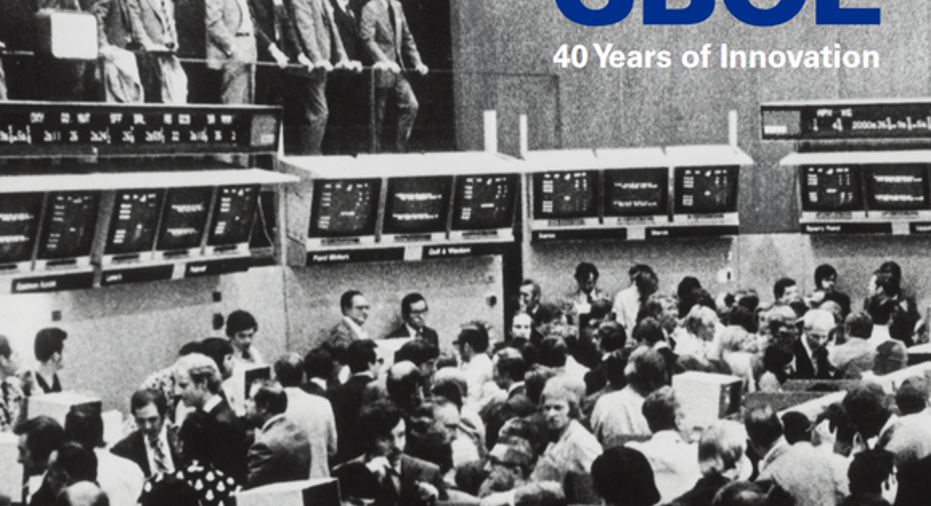What Is the CBOE?

Image source: CBOE.
Most investors are familiar with major stock markets like the New York Stock Exchange and the Nasdaq Stock Market. The CBOE isn't quite as familiar to most investors, but the exchange serves a valuable purpose in opening up the options market to the general public. Below, we'll talk more about the CBOE and the function it serves for investors looking to broaden their portfolios.
What the CBOE is
CBOE is the abbreviation for the Chicago Board Options Exchange. It is the world's largest options exchange, having served as an innovator of new option-based products since its first day of trading in 1973. The CBOE offers options contracts on hundreds of stocks and exchange-traded funds, as well as several of the most popular stock indexes. Among its proprietary products are stock index options on the S&P 500 , which are the most active index options in the U.S. market. These and other financial products give investors the opportunity to manage risk in executing their investment strategies.
The CBOE is owned by CBOE Holdings . For decades, the company was privately held, but in 2010, the CBOE held an initial public offering. Since then, the stock has done reasonably well, doubling from the price at which it started trading immediately following its IPO.
How the CBOE works
Options contracts are a bit more complicated than trading stocks or ETFs because of the need to settle options when they expire. The CBOE utilizes the help of the Options Clearing Corporation to help clear and issue options contracts. The OCC has systems in place to ensure the smooth functioning of the options markets, bringing buyers and sellers together and handling the subsequent transfers of securities or cash between option buyers and sellers at expiration.
The role of the OCC is extremely important because it safeguards the investors who buy and sell options contracts. For instance, when someone sells an option, they are taking on the obligations set forth in the options contract if the buyer eventually chooses to exercise the option. The OCC also helps set position limits on certain options in order to protect the options market from potential manipulation.
Investors are willing to trade on the CBOE in part because the OCC has a clearing mechanism that protects the options market from systemic risk. Without the OCC's efforts, the risk that the counterparty on the other side of the options trade might default on its obligations would make investors much less comfortable with trading on the CBOE.
The CBOE and volatility
One of the biggest innovations that the CBOE has launched involves its measure of financial market volatility. The CBOE Volatility Index measures the implied volatility in the stock market by looking at the trading activity and pricing of stock index options with certain expiration dates. The index has been dubbed the Fear Index by many market participants, because when the reading of the volatility index rises, it usually indicates nervousness among investors and a general drop in the stock market.
The Volatility Index and the related futures and options contracts offered in connection with the index aren't the only areas in which the CBOE has built up the options market. The CBOE has also given investors a wider range of available options, including options that offer weekly expirations rather than the traditional monthly expiration on the third Friday of every month. LEAPS, or long-term equity anticipation securities, have a much longer time frame than traditional options. LEAPS allow investors to hedge risk years into the future, whereas most options have maximum times to expiration measured in months rather than years.
Is the CBOE for you?
Many investors feel uncomfortable with options strategies. When you use them in certain ways, options can be extremely risky, and you can easily lose 100% of your investment with some options strategies.
However, options are much more flexible than most investors understand. You can use them to reduce risk rather than amplifying it, and when you do so, the rewards can include steady streams of income, smoother performance from year to year, and the potential for higher returns with lower overall risk.
By opening up the options market to the general public, the CBOE provides a useful service for investors. If you haven't considered using options, you should take a closer look at the products the CBOE provides to see if they can help you meet your financial goals.
The article What Is the CBOE? originally appeared on Fool.com.
Dan Caplinger has no position in any stocks mentioned. The Motley Fool recommends CBOE Holdings. Try any of our Foolish newsletter services free for 30 days. We Fools may not all hold the same opinions, but we all believe that considering a diverse range of insights makes us better investors. The Motley Fool has a disclosure policy.
Copyright 1995 - 2016 The Motley Fool, LLC. All rights reserved. The Motley Fool has a disclosure policy.



















